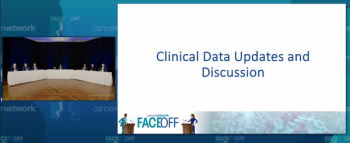Precision Oncology in AML: Molecular Insights, Maintenance Strategies, and Emerging Therapies

Panelists discuss how the all-oral regimen of oral azacitidine and venetoclax offers a promising treatment option for newly diagnosed and relapsed/refractory acute myeloid leukemia, highlighting its potential to improve patient outcomes and simplify treatment administration.

Panelists discuss how the updated results and longer follow-up from the AUGMENT-101 study of revumenib demonstrate its potential to improve outcomes in patients with relapsed/refractory KMT2Ar acute leukemia, offering a promising new option in this challenging subset of acute myeloid leukemia.

Panelists debate the best posttransplant follow-up approach for acute myeloid leukemia, weighing the benefits of maintenance therapy vs close monitoring with regular laboratory testing to optimize patient outcomes and minimize long-term risks.

Panelists debate the treatment of relapsed/recurrent acute myeloid leukemia, comparing the potential of menin inhibitors to standard-of-care therapies, including chemotherapy and BCL2 inhibitors, in improving patient outcomes.

Panelists discuss the clinical scenario of newly diagnosed acute myeloid lymphoma (AML) with an NPM1 mutation, exploring treatment strategies and key considerations for managing this patient population.

Panelists discuss the clinical scenario of TP53-mutant acute myeloid lymphoma (AML), focusing on treatment approaches and key challenges in managing this high-risk patient group.


